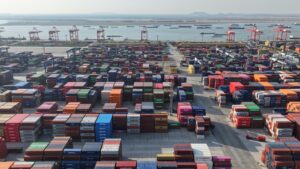Understanding the Impact of Tariffs on Consumer Prices: What You Need to Know
The economic landscape of the United States has been significantly shaped by trade policies, especially tariffs. Recently, Federal Reserve Chair Jerome Powell shared critical insights during a press conference, reiterating a crucial point: tariffs will raise consumer prices. At Extreme Investor Network, we believe it’s essential to delve deeper into this topic and understand how tariffs affect your wallet and overall financial health.
The Federal Reserve’s Stance on Inflation
In a recent analysis, the Federal Reserve raised its inflation forecasts, pointing to tariffs as a significant contributing factor. Powell noted, "A good part of it is coming from tariffs," indicating that even as pandemic-induced inflation begins to wane, tariffs are likely to complicate progress toward the Fed’s target inflation rate of 2% annually.
Economist Bradley Saunders from Capital Economics adds another layer to this discourse: "Tariffs are simply inflationary," a perspective that contradicts some public narrative surrounding their economic benefits.
Why Tariffs Hurt Consumers
Understanding Tariffs
Tariffs are taxes levied on imported goods, a mechanism intended to protect domestic industries from foreign competition. When U.S.-based businesses import products, whether it’s clothing, electronics, or food items, they pay these tariffs. This added cost often gets passed down to consumers in the form of higher prices at the register.
How Tariffs Increase Costs
- Higher Retail Prices: Importing businesses may choose to pass on the extra cost of tariffs to consumers rather than suffer a reduction in profits.
- Limiting Choices: While tariffs can make imported goods more expensive in comparison to domestic products, the irony is that U.S. alternatives may also be pricier. Consumers often find themselves facing higher prices, regardless of whether they opt for locally produced or imported items.
The Real Cost of Tariffs
Recent analyses suggest that tariffs could be costing the average American household around $1,200 annually. This figure is calculated based on existing levies that the Trump administration instituted on major trading partners like Canada, Mexico, and China.
While some proponents argue that these tariffs could drive job creation in specific sectors, many economists warn that the broader economic impact might actually lead to job losses in other areas due to increased production costs and retaliatory measures from foreign governments.
The Ripple Effect: Industries at Risk
Tariffs don’t just impact retail prices; they have a domino effect across various sectors. For instance, industries such as automotive and construction, which heavily rely on imported raw materials like steel and aluminum, face significant cost increases. Estimates suggest that tariffs could hiked vehicle prices by $4,000 to $12,500 or add approximately $9,200 to the cost of a new home.
Moreover, the Tax Foundation’s analysis indicates that current tariffs can affect over $1 trillion worth of goods, a trajectory that could potentially rise if temporary exemptions are eliminated.
Transitioning Tariffs: A Double-Edged Sword
In his remarks, President Trump acknowledged that tariffs could induce "short-term pain" for consumers and businesses alike. This brings us to a vital consideration: while tariffs may seem attractive in the short run for protecting select industries, they also make other sectors – and the economy overall – more vulnerable to external shocks.
Navigating Uncertainty: What You Should Do
The landscape of tariffs and inflation is fluid and fraught with uncertainty. As a consumer and an investor, vigilance is vital. Here are three proactive strategies to consider:
-
Diversify Your Spending: Explore local alternatives and adjust your budget to accommodate potential price increases. A more equitable distribution of spending can mitigate the effects of rising prices.
-
Stay Informed: Follow updates regarding trade policies and inflation forecasts. Understanding these factors can enhance your financial planning and investment decisions.
- Consult Financial Experts: If you’re concerned about how tariffs could affect your investments or financial health, consult experts who can provide targeted advice based on current economic data.
Conclusion
As tariffs continue to shape the U.S. economic terrain, understanding their implications is essential for effective personal finance management. At Extreme Investor Network, we aim to provide you with the knowledge and resources needed to navigate these complicated waters. By staying informed and adapting to market trends, you can better position yourself for financial stability in an uncertain economic climate.

